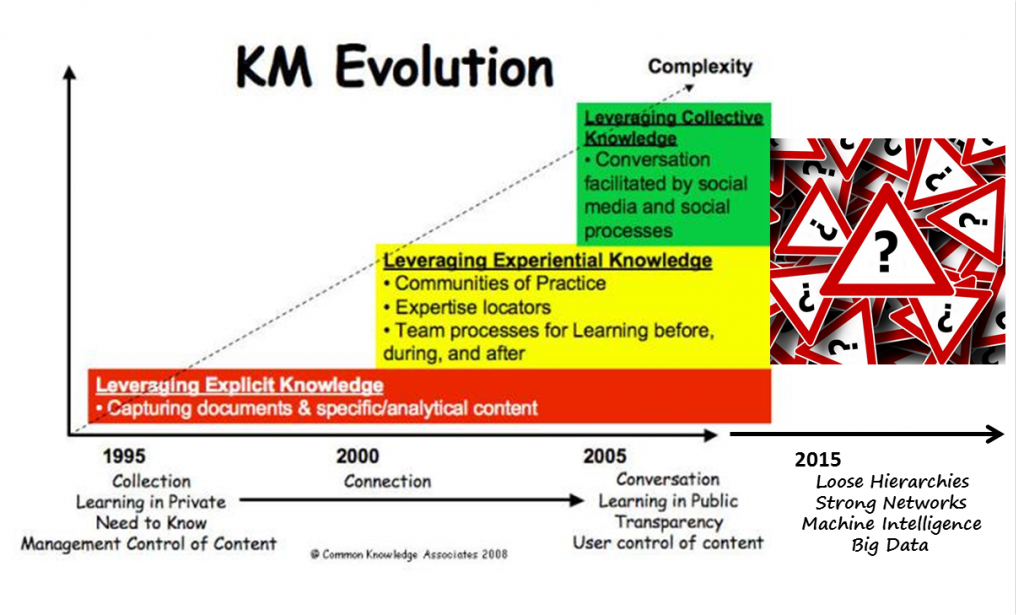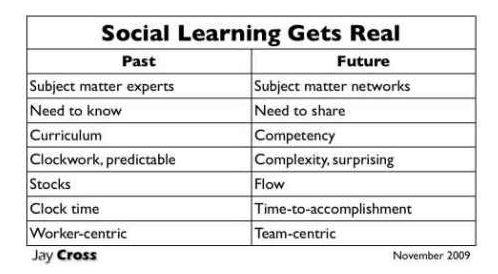This week in my course for Creighton University – ILD 831: Technology and Leadership – the students are exploring the concept of knowledge management. Nancy Dixon had described the three eras of knowledge management back in 2009 as moving from leaders leveraging explicit knowledge, to leaders leveraging experiential knowledge, and finally to leaders leveraging collective knowledge. I have remixed her graphic some to suggest that we have moved into a fourth ill-defined era:
 Harold Jarche in his post “Loose hierarchies for knowledge management” noted that KM has become contextual, requiring loose hierarchies and strong networks. This networked concept also surfaces in Weinberger’s (2012) Too Big To Know, which suggested the internet has fundamentally altered how organizations will work and succeed. According to Weinberger, knowledge in the past was seen as a narrowing pyramid, with those at the top having the most critical knowledge. Yet the web now allows any level of employee to gain information from the vast storehouse of human knowledge, and share that with anyone else at any level of an organization … or outside the organization. Jay Cross called this “social learning“.
Harold Jarche in his post “Loose hierarchies for knowledge management” noted that KM has become contextual, requiring loose hierarchies and strong networks. This networked concept also surfaces in Weinberger’s (2012) Too Big To Know, which suggested the internet has fundamentally altered how organizations will work and succeed. According to Weinberger, knowledge in the past was seen as a narrowing pyramid, with those at the top having the most critical knowledge. Yet the web now allows any level of employee to gain information from the vast storehouse of human knowledge, and share that with anyone else at any level of an organization … or outside the organization. Jay Cross called this “social learning“.
If knowledge is now socially developed, what is the role of leadership in knowledge management…particularly in a world in which, as Clay Shirky suggested, anyone can publish anything…and it is up to us to filter, rather than the previous centuries-old vetting process of filter…then publish? After all, is not knowledge management a form of filtering?
Thomas Davenport wrote off knowledge management in an op-ed piece for the Wall Street Journal last year. He suggested that individuals focused on managing knowledge missed the boat when big data came along.
“Any chance that this idea will come back? I don’t think so. The focus of knowledge-oriented projects has shifted to incorporating it into automated decision systems. The hot technology for managing knowledge is now IBM Corp.’s Watson—very different from the traditional KM model. Big Data and analytics are also much more a focus than KM within organizations. These concepts may be declining a bit in popularity too, but companies are still very focused on making them work.”
The tag line for David Weinberger‘s book is “Rethinking knowledge now that the facts aren’t the facts, experts are everywhere, and the smartest person in the room is the room.” In this era of machine intelligence and rapidly evolving work structures, we need to rethink knowledge. Davenport ends his piece suggesting that one should continue to believe in knowledge management, and I agree … but as Weinberger noted, we have to be smart differently.
I am looking forward to hearing what my students make of this evolving concept!

Clay Shirky suggested, anyone can publish anything…and it is up to us to filter, rather than the previous centuries-old vetting process of filter…then publish?
^ While I understand this in theory when it comes to actual practice… this is actually really hard! When I consider all of the content available on the web it can be really difficult at times to ascertain if it is valid. Any suggestions on ways to “filter” more effectively?